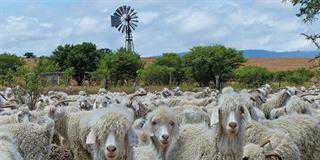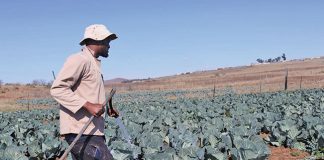William Matasane of Senekal is the 2010 Grain SA/ABSA Developing Grain Producer of the year. He produces maize and sunflowers, and says his secret to success lies in chasing profit and managing risk carefully. “When I started farming on my own on Verblyden, I decided to farm to make money. This is the only way developing farmers can survive economically,” says William.
“Before I bought Verblyden, I farmed in a partnership with three other farmers. That’s where I learnt that group farming simply doesn’t pay. We can all sing together in church, but there’s only one pastor. In 2004 I bought Verblyden with the assistance of the land affairs department and a Land Bank loan of R170 000. My farm is now paid off and I can work towards my family’s future.”
William’s challenges
William farms on 900ha. Aside from the 400ha on Verblyden, he leases arable land in the Ventersburg district. The past production season he planted 180ha to maize and 250ha to sunflower. “I used to grow wheat as well, but low prices forced me to stop,” he says. His greatest challenge is risk management.
“With the current maize price, I find it difficult to make money. I have to market the maize as quickly as possible after harvesting, because I depend on production credit from the bank. Storage fees are also high. It costs about 50c/t/day to store grain in a commercial silo.”
With a maize producer price of R850/t and input costs of R4 200/ha, William will only plant 92ha of maize this year.He farms on mainly clay soil with an annual average rainfall of 700mm. He adds nitrogen and phosphate to balance the soil. But a lack of contouring in the lands is also a problem on Verblyden. “Contouring will prevent water run-off and contribute to optimum yield and profit,” explains William. “I applied to the Free State agriculture department for assistance, and officials came here to map out the contours.”
Harvesting and equipment
William achieved an average rainfed maize yield of 5t/ha during the past production season, with some 16 000 plants/ha. He hadn’t started planting at the time of Farmer’s Weekly’s visit, but believes it’s unwise to plant maize later than 16 December in the Senekal district. “We’re prone to early cold snaps and frost,” he explains. “Planting too late could mean trouble later in the season. I’ve prepared my lands and I’m waiting for rain.
”He intends to use Monsanto’s DKC 78-45 and DKC 78-35 seed this year. Like his maize, his sunflower is marketed through Afgri. “The best time to plant sunflower is between 25 November and 10 January,” says William.“Sunflower planted after Christmas yields less than sunflower planted early in the season. It’s also prone to the heat and drought in January and February.”
He plants some 33 000 plants/ha at an input cost of nearly R3 500/ha. William realised an average yield of 1,7t/ha with the latest harvest and he’s already negotiating with Afgri for this production season’s delivery in April next year.He believes it makes financial sense to buy second-hand equipment in good condition.
His fleet of tractors consists of two 399 Massey Fergusons, a 440 John Deere, a 1 066 International and two Fiats – a 640 and a 600. He also uses two John Deere planters, a 9-75 John Deere combine harvester, and two Slattery harvesters. “I repair all the equipment myself. It’s cheaper to do it yourself.”
Goals for the future
Because of the decreasing profit margins in grain production, William plans to increase his cattle component. Currently, he runs a commercial beef cattle herd of 70 cows and calves, with a 91% calving rate. The grazing on Verblyden is limited and he leases some 300ha municipal land in Winburg for the cattle. Stock theft isn’t a problem on Verblyden, but in Winburg it’s so bad he has to hire full-time herdsmen to look after the cattle.
William is a proud member of Grain SA and serves on the organisation’s executive committee. “Grain SA, Johan Kriel and the other members of the Grain SA Farmer Development Programme taught me to farm profitably,” he says. “I’m proud to belong to Grain SA’s 1000 Ton Club, comprising developing farmers who produce 1 000t of grain and more annually.” He says he would never have won the Grain SA 2010 Developing Farmer of the Year award were it not for the support the organisation afforded him.
Contact William Matasane on 083 521 2044.












